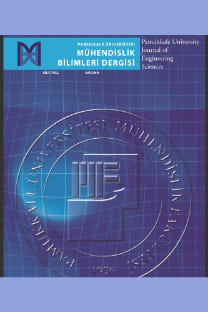Olay tabanlı sistemlerde karmaşık olayların tespiti amaçlı gerçek zamanlı izleme alt yapısı
Karmaşık olay işleme, Olay tabanlı sistemler, Sürekli veri akışı, Gerçek zamanlı izleme sistemleri
Detecting complex events with real time monitoring infrastructure on event-based systems
Complex event processing, Event-Based systems, Continuous data streaming, Real-Time monitoring systems,
___
- Bifet A. ”Mining big data in real time”. Journal of Informatica, 37(1), 15-20, 2013.
- Scott M. Real-Time Marketing and PR, Revised: How to Instantly Engage Your Market, Connect with Customers, and Create Products that Grow Your Business Now, Wiley Desktop Editions Series, John Wiley & Sons, 2011.
- Mishra N, Meyerson A, Guha S, Motwani R. “Streaming-data algorithms for high-quality clustering”. Proceedings of the 18th International Conference on Data Engineering, ICDE-2002, San Jose, CA, USA, 26 February-1 March 2002.
- Leskovec J, Rajaraman A. Ullman J. Mining of Massive Datasets, Cambridge University Press, www.mmds.org, 2010.
- Shanahan G, Laing D. “Large scale distributed data science using apache spark”. Proceedings of the 21th ACM SIGKDD International Conference on Knowledge Discovery and Data Mining, Sydney, NSW, Australia, 10-13 August, 2015.
- Surshanov, S. “Using apache storm for big data”. Computer Modelling & New Technologies, 19(3B), 14-17, 2015.
- Tas Y, Baeth MJ, Aktas M. “An Approach to Standalone Provenance Systems for Big Social Provenance Data”, 12th International Conference on Semantics, Knowledge and Grids, Beijing, China, 15-17 August 2016.
- White T. Hadoop: The Definitive Guide. 3rd ed. Sebastopol, CA, O’Reilly, 2015.
- Baeth M, Aktas M. “Detecting misinformation in social networks using provenance data”. Concurrency and Computation: Practice and Experience, doi: 10.1002/cpe.4263, 31(3), 1-9, 2019.
- Dean J, Ghemavat S. "MapReduce: Simplified data processing on large clusters". 6th Symposium on Operating System Design and Implementation (OSDI-2004), San Francisco, CA, 3 October 2004.
- Husain M, Jalab H, Rohani V. Optimized-Memory Map-Reduce Algorithm for Mobile Learning. Editors: Zaman HB, Robinson P, Smeaton AF, Shih TK, Velastin S, Jaafar A, Ali NM. Advances in Visual Informatics, 249-256, Boston, MA, Springer, 2015.
- Ranjan, R. “Streaming big data processing in data center clouds”. IEEE Cloud Computing, 1(1), 78-83, 2014.
- Aktas M. “Hybrid cloud computing monitoring software architecture”. Concurrency and Computation: Practice and Experience, 4694, 30(21), 1-9, 2018.
- Aktas M, Astekin M. "Provenance aware run-time verification of things for self-healing Internet of Things applications". Concurrency and Computation: Practice and Experience, 4263, 31(3), 1-9, 2019.
- Fox G, Aktas M, Aydin G, Bulut H, Pallickara S, Pierce M, Sayar A, Wu W, Zhai G. Real Time Streaming Data Grid Applications. Editors: Davoli F, Palazzo S, Zappatore S. Distributed Cooperative Laboratories: Networking, Instrumentation and Measurements, 253-267, Boston, MA, Springer, 2006.
- Fox G, Aktas M, Aydin G, Gadgil H, Pallickara S, Pierce M, Sayar A. “Algorithms and the Grid”. Computing and visualization in science, 12(3), 115-124, 2009.
- Baeth M, Aktas M. “An approach to custom privacy policy violation detection problems using big social provenance data”. Concurrency and Computation: Practice and Experience, 30(21), 1-9, 2018.
- Chen P, Plale B, Aktas M. “Temporal representation for mining scientific data provenance”. Future generation computer systems, 36, 363-378, 2014.
- Chen P, Plale B, Aktas M. “Temporal representation for scientific data provenance”. IEEE 8th International Conference on E-Science (e-Science), Chicago, IL, USA, 8-12 October 2012.
- Baloglu A, Aktas M. “BlogMiner: Web blog mining application for classification of movie reviews”. 5th International Conference on Internet and Web Applications and Services (ICIW), Barcelona, Spain, 9-15 May, 2010.
- Aktas M, Plale B, Leake D, Mukhi N. Unmanaged workflows: Their provenance and use. Editors: Liu Q, Bai Q, Giugni S, Williamson D, Taylor J. Data Provenance and Data Management in e-Science, 59-81, Berlin, Heidelberg, Springer, 2012.
- Jensen S, Plale B, Aktas M, Luo Y, Chen P, Conover H. “Provenance capture and use in a satellite data processing pipeline”. IEEE Transactions on Geoscience and Remote Sensing, 51(11), 5090-5097, 2013.
- Palmer J. “Web site usability, design, and performance metrics”. Information systems research, 13(2), 151-167, 2002.
- Kaushik A. Web Analytics: An Hour A Day, 1st Edition, Indianapolis, Indiana, USA, Wiley Publishing, 2007.
- Aktas M, Pierce M, “High-performance hybrid information service architecture”. Concurrency and Computation: Practice and Experience, 22(15), 2095-2123, 2010.
- ISSN: 1300-7009
- Başlangıç: 1995
- Yayıncı: PAMUKKALE ÜNİVERSİTESİ
Akıllı telefon ve giyilebilir cihazlarla aktivite tanıma: Klasik yaklaşımlar, yeni çözümler
Jemshit ISKANDEROV, Mehmet Amaç GÜVENSAN
Taksonomik çeşitlilik tabanlı protein altünite etkileşim tahmini
Serkan Dişlitaş, Hilmi Yanmaz, Günay Ömer, Raşit Ahıska
Bir depolama tesisi için otomasyon sisteminin tasarımı ve uygulanması
Serkan Kırca, Ethem Kelekçi, Murat Ayaz
Engin Maşazade, Volkan Talha Doğukan, Veysel Yaman Akgün
Tek fazlı şebeke bağlantılı transformatörsüz PV evirici sistem kontrolü
Çeyrek ayna süzgeç bankası tasarımında Kaiser-Hamming penceresinin performansının incelenmesi
Bircan KAMIŞLIOĞLU, Nurhan KARABOĞA
İnsan-robot etkileşiminin biyomimetik yaklaşımla sağlanması
Sürekli mıknatıslı senkron generatörün azaltılmış anahtarlı evirici ile sensörsüz kontrolü
